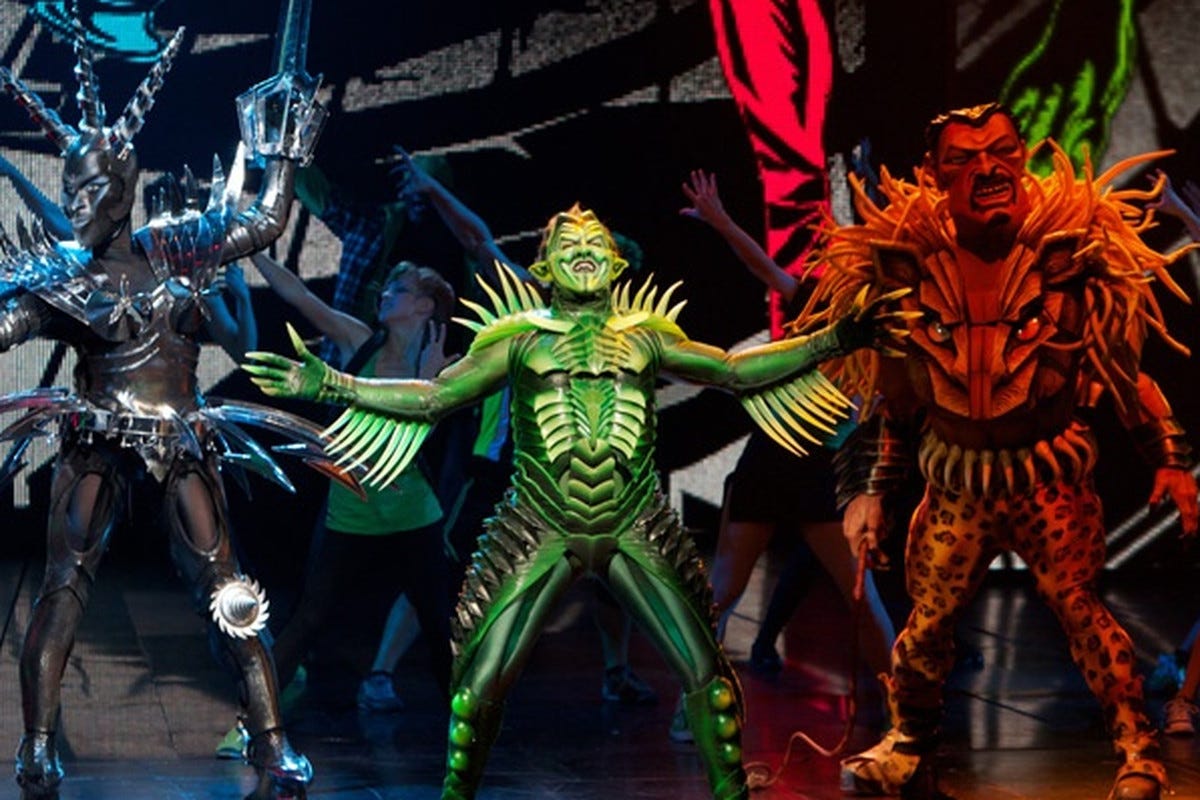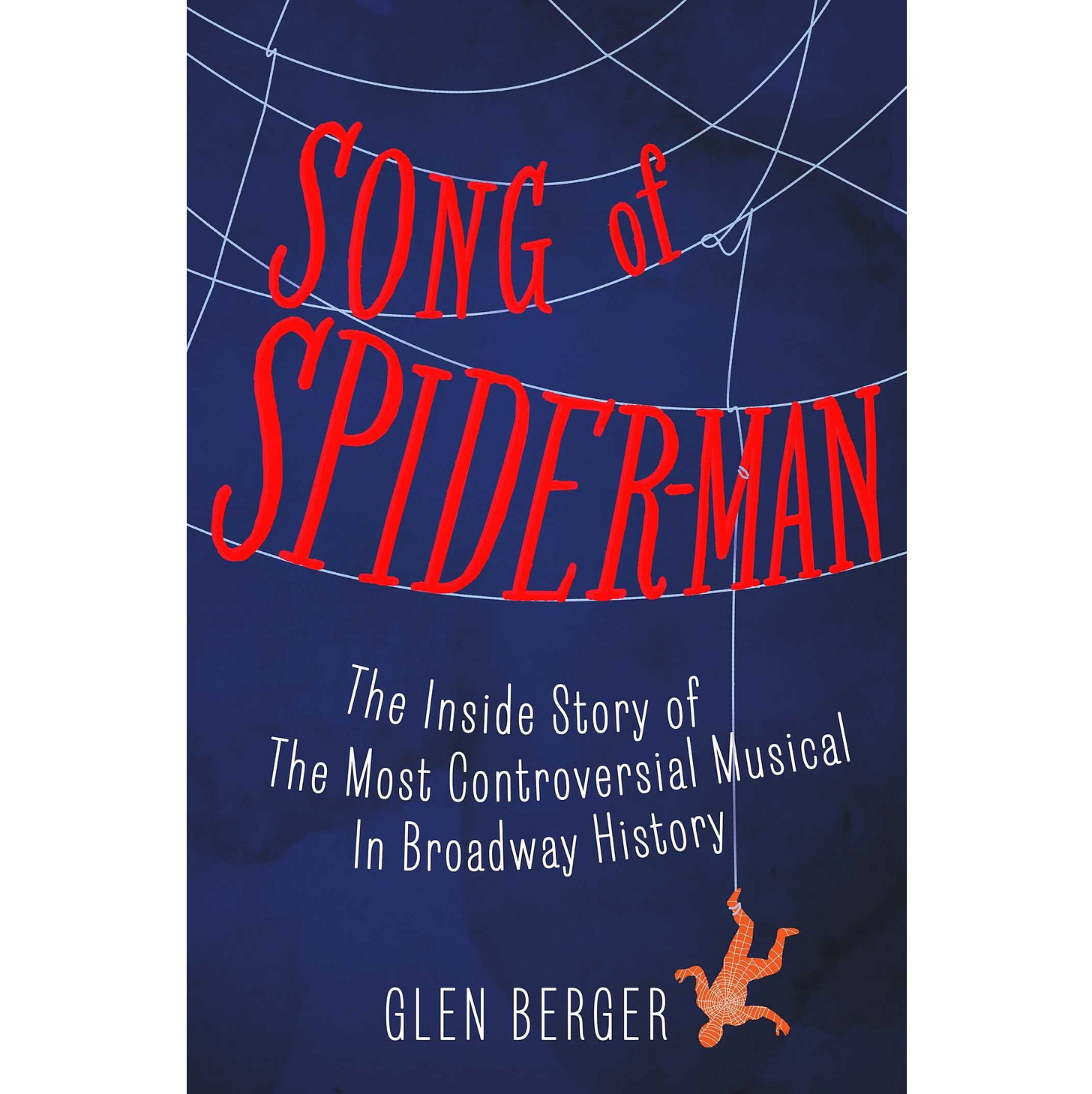Remembering the 'Spider-Man' Broadway Musical Disaster
In this 2013 interview, show scribe Glen Berger discusses his tell-all memoir about the doomed project
by Tom Blunt
For several years, Glen Berger's entire life dangled from a thread no stronger than a spiderweb. As the principle script-writer for Spider-Man: Turn Off the Dark, he worked alongside Julie Taymor and U2's Bono and The Edge on what became the most sensational, most expensive, and most embattled production in Broadway history.
Only one of those descriptors is not up for negotiation: At the time it officially opened in 2011, $75 million had already been sunk into the show. Despite its many woes — recounted in delicious, excruciating detail in Berger's new tell-all, Song of Spider-Man — the show still ran for two years and broke box-office records before its closure was finally announced last week. Spidey will be flying again soon, however, when the show tries its luck in Las Vegas. What can we expect from the musical's next incarnation, and what's it like to be among those personally left in its wake? Berger's here to share all he can say.
TOM BLUNT: A lot of people have reacted to the news about the show's move to Vegas with instinctive acceptance: It was never a perfect fit for Broadway, and in part it was never meant to be. You've written about the initial creative team's resistance to staging this one-of-a-kind Spider-Man spectacular on Broadway in the first place. Do you think the Vegas move will put the show any closer to the original crew's creative vision, or will it just continue metastasizing into a completely different entity?
GLEN BERGER: I wrote in the book that the Green Goblin's credo became the credo of the show itself: “Mutate or Die.” So I think you're right — it'll just keep metastasizing. Everyone's original reluctance to put Spider-Man on Broadway had to do with how the show would be perceived. Julie worried audiences (or critics at least) would be too concerned with things like "plot." (For instance, who cared about the woolly plots in a Cirque show? she'd ask.) But we didn't want the show in Vegas until at least the fourth production, because we also wanted the show to be perceived as "classy." I think what it comes down to: a new production isn't happening without the enthusiastic involvement of Marvel, so I could be wrong but I think the Vegas version will be even further from the original crew's vision, and hew even closer to what Marvel would be looking for (e.g., more stunts, an origin story with more Uncle Ben, maybe even some Harry Osborn, and so on).
TB: Many people are interested in reading this book for behind-the-scenes gossip about Julie Taymor, but I think anyone who's worked in the arts will recognize the love, respect, fear, and resentment that are all pretty much part of any collaborative relationship; the personal and professional stakes just happened to be much much higher in this case. Has this experience changed the way you interact with other artists? Has it changed your relationship with your own creative inspiration?
GB: Hah — what you didn't see was how that question just left me staring out a window for ten minutes, deep in a swirl of stuff. Love, respect, fear, resentment — those are the words, brother. I'll leave it at two thoughts:
Thought number one: The science-writer Stephen Jay Gould, talking about the never-ending conflict between science and religion, proposes something called "Non-Overlapping Magisteria," in which each has their own domain of authority and expertise. The same idea should probably be applied to collaboration between writers, directors, producers, designers, etc. Goodwill, respect, but, most of all, well-defined, uncrossable borders should be the rule.
And I doubt I'll be able to "co-write" anything again. (I think a lot about the Coen Brothers, or the Farrelly Brothers, or the Wachowskis — maybe you have to be siblings for co-writing to work out.) And will I ever be able to tolerate again a non-writer — be they director, producer, co-writer, or anyone — telling me how to write? No. This, unfortunately, is going to make me a bit of a bully and a bit of a headache for future employers. So be it! The product will be better. Or I'll get fired. Nevertheless, so be it.
Thought number two: Right after Spider-Man opened, I wound up performing Chekhov's The Seagull with a number of beautiful souls. The humanity in Chekhov's writing — the acknowledgment, nay, the embrace of human beings' passions and flaws — infused the whole enterprise, and was the unexpectedly perfect antidote to what ailed me after Turn Off the Dark. And it all reminded me of that old quote from E.M. Forster: "Only Connect." Which I've probably been misinterpreting all these years, but I take it to mean there's nothing more important than the act of connection between two people. Some folks get that, others don't. And if you're working with one who doesn't get that, bow respectfully to them and then very quickly run away, because nothing artistically worthwhile will come of it.
TB: I saw the Rockettes Christmas Spectacular recently, and the scale and expense of it reminded me of your book, of the uneasy bargains that are struck between art, entertainment, and financing. Can you think of any big shows or creative efforts that you think have truly, successfully (improbably) managed to balance all three?
GB: There was a moment during the thick of it when Bono turned to me — bewildered more than anything else — to say how he had really assumed that Julie and he were on the same page. That she "got it." That — given Julie's experience with The Lion King, and U2's decades-long success at filling arenas without feeling like they ever had to compromise their artistic integrity to get there — Bono felt like Julie understood how there was a way to make the investors, the audience, and the "artist" all happy. At the time, Bono and Edge were in the middle of their 360 Tour — a capital-M Massive undertaking that was also a great show and a money-maker. You can balance all three, you really can. And if you do, then you get fame, money, and critical acclaim— all very nice things. But you know what? None of them are crucial things. Breathing, loving, creating, and deepening in wisdom — those are the crucial things for an artist. You can do those things without making promises to investors. If you make promises to investors, you need to try to keep them.
TB: Writing can be isolating, but people don't think of scriptwriting as a career path that literally takes people away from their families. Nevertheless, the strain that Spider-Man put on your family life over the years became a pivotal part of your story. Was writing this book therapeutic for you in that sense? It moved me to imagine how much your children may appreciate being able to read all this someday.
GB: You're absolutely right — my wife and I spared so much of what went on from the young ones. Really all that my three children could comprehend was that after Spider-Man had been a theme in their lives for almost as long as they'd been alive, it was now keeping Dad away from home for almost a year. So there was an element in the writing of the book where I was very aware that this was a 384-page warts-and-all explanation of events they were too young to understand. I mean, wouldn't we all want our dads to bequeath a tale about a significant time of their lives? I just think getting that sort of insight into your father would be pretty cool.
TB: I think your story unspools in a very cinematic way. Has there been any interest in the film rights? Is that something you'd be interested in seeing, or does it just sound like a continuation of the same legal headaches you've already endured?
GB: I'm worried that I'm developing a weird fetish for legal headaches. It's all so interesting watching how things get interpreted in the media, and how people interpret those interpretations. Anyway, yeah, I think it would make a great movie. My dream director for it would be Spike Jonze. I think maybe there are even people out in filmland reading the book and considering the idea. I doubt anything will come of it. But what do I know? Really, what I should have done was written the book as a graphic novel. That would have satisfied the cinematic aspect of the tale as well as honor the comic-book roots of the whole thing. But I thought of that idea too late to go back to Simon & Schuster with it. Ah well.
•
If you’ve enjoyed reading this free post, why not subscribe for more JUDGEMENT? Sign up to have free content delivered straight to your inbox, or pay $5 for monthly subscriber-exclusive content! Thank you for enduring this sales pitch.




